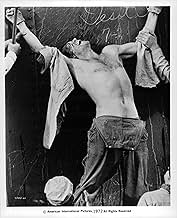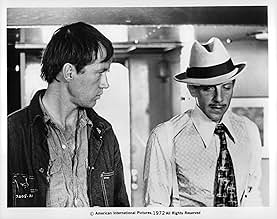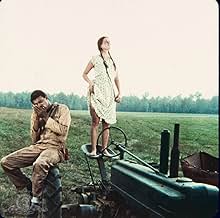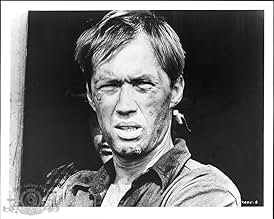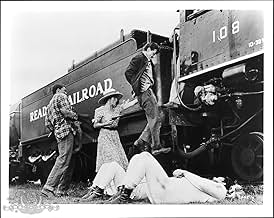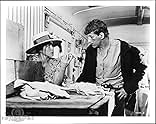IMDb रेटिंग
6.0/10
12 हज़ार
आपकी रेटिंग
अपनी भाषा में प्लॉट जोड़ेंDuring the Great Depression, a union leader and a young woman become criminals to exact revenge on the management of a railroad.During the Great Depression, a union leader and a young woman become criminals to exact revenge on the management of a railroad.During the Great Depression, a union leader and a young woman become criminals to exact revenge on the management of a railroad.
- निर्देशक
- लेखक
- स्टार
- पुरस्कार
- कुल 1 नामांकन
David Osterhout
- McIver #2
- (as David R. Osterhout)
Grahame Pratt
- Emeric Pressburger
- (सिर्फ़ क्रेडिट)
'Chicken' Holleman
- M. Powell
- (सिर्फ़ क्रेडिट)
Harry Northup
- Harvey Hall
- (as Harry Northrup)
Jerry Cortez
- Sheriff
- (बिना क्रेडिट के)
Louie Elias
- Boxcar Tough
- (बिना क्रेडिट के)
Michael Fitzgerald
- Apple Peeler
- (बिना क्रेडिट के)
Gura Lashlee
- Hobo
- (बिना क्रेडिट के)
Gerald Raines
- Train Engineer
- (बिना क्रेडिट के)
फ़ीचर्ड समीक्षाएं
Boxcar Bertha is an early Scorcese, made just on the eve of his highly personal breakthrough film Mean Streets. In other words, these were the days before he could call the shots and was merely a jobbing director. It's a cheap exploitation flick, and like most B-pictures it's a cash-in knock-off of a recent hit movie in this case Bonnie and Clyde. It crams in all the essential ingredients for the genre hold-ups, union men, pinkertons, chain gangs and, of course, boxcars along with a dash of nudity and gory violence to help it sell.
The story follows the same arc as its peers likable proles take to a life of crime to escape the depression, have a number of run-ins and adventures, until they eventually meet their downfall. The screenplay is fairly lazy and predictable, although the writers have tried to inject some depth and conflict to the characters. Bill, for example, struggles to reconcile his socialist values with his individualist criminal antics. Rake is ashamed of his cushy city roots and wants desperately to prove himself. Bertha herself is portrayed as a kind of happy-go-lucky individual with no real agenda apart from living the life she enjoys and being with the man she loves. Sadly these ideas are never fully explored, and tend to get lost behind the simplistic b-action setting.
Boxcar Bertha also happens to be surprisingly loaded with religious references, painting Bill as a Jesus-like figure. Most obvious of these is the highly symbolic ending, but there are a number of more subtle hints. A scene somewhere in the middle opens with David Carradine standing before a biblical fresco, and later in the city Barbara Hershey stops to look at a film poster for The Man who Could Work Miracles. The religious angle is something which actually runs through all of Scorcese's work, rarely stated out loud but always under the surface.
Scorcese's technical style is fairly functional and not too flamboyant, but there are some hints towards the methods he would later make his own. He relies very heavily upon the editing process for impact a dynamic cut emphasises every moment of action. There aren't too many of the lengthy tracking shots that he is known for, and what camera moves there are are shaky and poorly planned, even if he really is trying to make something of them. This is all understandable though planning elaborate camera moves is very time consuming, and apparently the shoot for this picture was a mere twenty-four days. Besides, snappy editing is a good way to get something out of next to nothing in a fast-paced action flick.
It's an interesting touch to see father and son actors John and David Carradine playing each others nemeses. Both are fine actors, although unfortunately the former was largely relegated to minor supporting parts in A pictures, while the latter was usually lumbered with lead roles in B pictures. Only occasionally did either of them get to shine, and Carradine Senior is particularly good here even if it is another small role. But the real standout here is Barbara Hershey in the title role. She gives Bertha a kind of playful innocence, but allows the character to mature and show more depth of emotion towards the end of the picture.
When all's said and done, Boxcar Bertha is a cut above the average cheapie, but only a small cut. Scorcese has done a fair job with the material, and there is an occasional surprising moment of quality. It's good fun too in many places, particularly the cheeky dialogue given to Bernie Casey (Von), as well as the Laurel and Hardy-like pinkerton agents. But it also has a dull plot, annoying musical score, cheep-and-cheerful production values and is just too short to really take off.
The story follows the same arc as its peers likable proles take to a life of crime to escape the depression, have a number of run-ins and adventures, until they eventually meet their downfall. The screenplay is fairly lazy and predictable, although the writers have tried to inject some depth and conflict to the characters. Bill, for example, struggles to reconcile his socialist values with his individualist criminal antics. Rake is ashamed of his cushy city roots and wants desperately to prove himself. Bertha herself is portrayed as a kind of happy-go-lucky individual with no real agenda apart from living the life she enjoys and being with the man she loves. Sadly these ideas are never fully explored, and tend to get lost behind the simplistic b-action setting.
Boxcar Bertha also happens to be surprisingly loaded with religious references, painting Bill as a Jesus-like figure. Most obvious of these is the highly symbolic ending, but there are a number of more subtle hints. A scene somewhere in the middle opens with David Carradine standing before a biblical fresco, and later in the city Barbara Hershey stops to look at a film poster for The Man who Could Work Miracles. The religious angle is something which actually runs through all of Scorcese's work, rarely stated out loud but always under the surface.
Scorcese's technical style is fairly functional and not too flamboyant, but there are some hints towards the methods he would later make his own. He relies very heavily upon the editing process for impact a dynamic cut emphasises every moment of action. There aren't too many of the lengthy tracking shots that he is known for, and what camera moves there are are shaky and poorly planned, even if he really is trying to make something of them. This is all understandable though planning elaborate camera moves is very time consuming, and apparently the shoot for this picture was a mere twenty-four days. Besides, snappy editing is a good way to get something out of next to nothing in a fast-paced action flick.
It's an interesting touch to see father and son actors John and David Carradine playing each others nemeses. Both are fine actors, although unfortunately the former was largely relegated to minor supporting parts in A pictures, while the latter was usually lumbered with lead roles in B pictures. Only occasionally did either of them get to shine, and Carradine Senior is particularly good here even if it is another small role. But the real standout here is Barbara Hershey in the title role. She gives Bertha a kind of playful innocence, but allows the character to mature and show more depth of emotion towards the end of the picture.
When all's said and done, Boxcar Bertha is a cut above the average cheapie, but only a small cut. Scorcese has done a fair job with the material, and there is an occasional surprising moment of quality. It's good fun too in many places, particularly the cheeky dialogue given to Bernie Casey (Von), as well as the Laurel and Hardy-like pinkerton agents. But it also has a dull plot, annoying musical score, cheep-and-cheerful production values and is just too short to really take off.
Martin Scorsese got hired by Roger Corman, I presume, to make this "based on true story" movie of a boxcar thief and robber named Bertha whom with some other robbers stole their way into a small piece in history but got into strife towards the end. It isn't one of his best pictures since he really was just the director and the script and the actors did more work than he needed to do on the picture. Like The Color of Money, it's a film that if he didn't direct it it wouldn't of made much of a difference in the outcome.
Still, give credit where credit is due, and those (very few I might think) that heard what Cassavettes said to Scoresese after the movie got released (he told Marty that it was a piece of s*** and to work on something better- which he did with Mean Streets) should disregard it. Overall, Boxcar Bertha is a watchable and good piece of cinema with some decent performances and an overall feel that works in it's "tradition of Bonnie & Clyde" genre. Hershey and Carradine are also good. Just don't expect anything ground-breaking, unlike the next 5 out of 6 movies Scorsese would make in the next eight years after this. B+
Still, give credit where credit is due, and those (very few I might think) that heard what Cassavettes said to Scoresese after the movie got released (he told Marty that it was a piece of s*** and to work on something better- which he did with Mean Streets) should disregard it. Overall, Boxcar Bertha is a watchable and good piece of cinema with some decent performances and an overall feel that works in it's "tradition of Bonnie & Clyde" genre. Hershey and Carradine are also good. Just don't expect anything ground-breaking, unlike the next 5 out of 6 movies Scorsese would make in the next eight years after this. B+
Director Martin Scorsese stages some beautifully choreographed violence in "Boxcar Bertha", his first studio film, but he had yet to break through to his actors, and much of the picture is stilted or awkward. Barbara Hershey plays Bertha Thompson, a teenage orphan in Depression-scarred Arkansas who falls in league (and in love) with a union organizer; they're joined by a black harmonica player and a Yankee card-shark to take revenge on the railroad company by robbing the trains. Adapted from Ben L. Reitman's book "Sister of the Road", Scorsese as a filmmaker is a bit misplaced within this milieu--the 1930s doesn't seem to be his thing--and while the film has atmosphere, it lacks visual assurance and nuance. Similarly, Hershey doesn't seem to connect with the Depression, either; with her dreamy eyes, flowing chestnut hair and penchant for throwing her lines away blithely, she's more like a Boxcar Hippie. Still, Scorsese uses her well at certain moments, particularly early on when she's shooting craps around a campfire, correcting a friend about her surname, or staring out a rain-soaked window. She also looks great chasing after locomotives, and the train sequences are all well-filmed. The finale, a slaughter out in the middle of nowhere, packs a visual wallop. It seems certain the youthful director saved his creative juices for this sequence, and his cinematic prowess suddenly flairs up. Visceral and expressive, this showdown turns the story around from mere exploits of low-class gangsters into something far more profound: a sorrowful human tragedy soaked in consequence and fate. **1/2 from ****
Scorsese refers to this 1972 Roger Corman quickie--he shot it in the deep South in twenty-one days--as his "exploitation picture." Funny, that--if it came out today, it'd be the height of the Arty Independent Film. Barbara Hershey and David Carradine are this movie's knockoff of Bonnie and Clyde; the script ain't much, but Scorsese storyboarded every shot and hoo doggie! This guy was the greatest shotmaker ever, even when he was on Skid Row. Rent it for Hershey's lyrical style and the chance to discern the fetus of a genius.
Boxcar Bertha is a fine film and entertaining at times. It supposedly tells a "true story" but I doubt we can be expected to believe every word of it. Nor should we. This is clearly the "fictionalization" version.
All the same; that doesn't make it any better. There are some good scenes here and there and a few good lines and one or two great stunts and effects.
But at the end of the day it has to be s pass for me. Not Scorsese at his best, but does show him as an up and coming director as he developed his style. So for that reason it can be counted as a historical record but nothing more.
All the same; that doesn't make it any better. There are some good scenes here and there and a few good lines and one or two great stunts and effects.
But at the end of the day it has to be s pass for me. Not Scorsese at his best, but does show him as an up and coming director as he developed his style. So for that reason it can be counted as a historical record but nothing more.
What Scorsese Film Ranks Highest on IMDb?
What Scorsese Film Ranks Highest on IMDb?
Cinema legend Martin Scorsese has directed some of the most acclaimed films of all time. See how IMDb users rank all of his feature films as director.
क्या आपको पता है
- ट्रिवियाAfter he finished this film, Martin Scorsese screened it for John Cassavetes. Cassavetes, after seeing it, hugged Scorsese and said, "Marty, you've just spent a whole year of your life making a piece of shit. It's a good picture, but you're better than the people who make this kind of movie. Don't get hooked into the exploitation market, just try and do something different." Scorsese's next film was Mean Streets (1973).
- गूफ़The currency shown in the film is all modern, post 1960s, with modern banking money bands.
- भाव
Boxcar Bertha: Pay no attention to that man behind the curtain.
- क्रेज़ी क्रेडिटOpening Statement: The following events are adapted from the true experiences of Boxcar Bertha Thompson, as related in the book "Sister of the Road"
- इसके अलावा अन्य वर्जनThe restored 2020 version added a 12 seconds shot introducing the party around the 58th minute.
- कनेक्शनFeatured in The Directors: The Films of Roger Corman (1999)
टॉप पसंद
रेटिंग देने के लिए साइन-इन करें और वैयक्तिकृत सुझावों के लिए वॉचलिस्ट करें
- How long is Boxcar Bertha?Alexa द्वारा संचालित
विवरण
बॉक्स ऑफ़िस
- बजट
- $6,00,000(अनुमानित)
- दुनिया भर में सकल
- $6,443
- चलने की अवधि
- 1 घं 28 मि(88 min)
- रंग
- पक्ष अनुपात
- 1.85 : 1
इस पेज में योगदान दें
किसी बदलाव का सुझाव दें या अनुपलब्ध कॉन्टेंट जोड़ें



